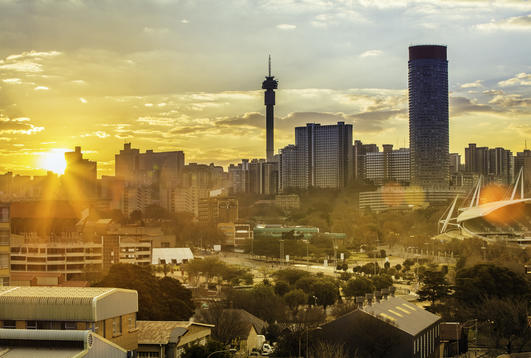Johannesburg – As the country’s industrial powerhouse, Gauteng Province is a significant contributor to environmental degradation because of its heavy reliance on carbon-intensive energy, meaning it must continue to intensify its efforts to combat climate change.
To do so effectively, the Gauteng Department of Agriculture, Rural Development and Environment (GDARDE) announced that it has appointed a specialist environmental consultancy firm to develop a greenhouse gas (GHG) inventory.
The inventory system provides valuable data on the carbon footprint of the province’s economic activities. The consulting firm is scheduled to complete its report during the second quarter of next year.
“The last inventory for Gauteng was conducted in 2010. Since then, emissions may likely have developed differently than expected due to increased industrialisation and possible disruption of existing emission-reducing initiatives,” says Mr Loyiso Mkwana, GDARDE’s Chief Director for Environment Management.
“We continue to observe climate change-related frequent and severe natural catastrophes such as violent thunderstorms, drought and flash floods. But we need to understand scientifically if the tremendous efforts by both the public and private sectors to alleviate the impact of climate change are having the desired long-term effect,” Mr Mkwana explains.
The exercise being undertaken by the consultancy firm, which provides sustainability solutions to both the private and public sectors, will, therefore, determine a new GHG emission profile. Similarly, this process will also recommend new emission projections and targets for the province.
Furthermore, it will enable the country’s biggest economic hub to optimise emissions reporting and accounting through a systematic monitoring, reporting and verification methodology.
“In simple terms, we will be able to assess, measure, and track the greenhouse emissions that play a role in this over time. Most importantly, do so accurately and continually monitor the province's efforts at reducing its carbon footprint,” Mr Mkwana added.
The other factor is that it will contribute toward South Africa’s international climate change mandatory reporting requirements to climate change bodies such as the United Nations Framework Convention on Climate Change.
GDARDE coordinates the various climate change projects implemented in the province to promote a low-carbon economy and climate resilience. Currently, 104 recorded and verified climate change-related projects are in the Climate Change Implementation Plan and Project Register.
In 2015, the Department launched the Gauteng Industrial Symbiosis Programme, a resource-efficient initiative that resulted in 1500 tonnes of GHG emission reduction. The programme involving 1 400 companies has resulted in significant savings in water and other natural resources and the deployment of resource efficiency and cleaner production processes.
Gauteng Province has also established the Premier’s Expert Advisory Committee on Climate Change, which guides and accelerates the implementation of the Gauteng Climate Action Plan and provides expert advice on elements of a Just Transition pathway for the Gauteng City Region. The Committee consist of members from the Government, private sector, research institutions, and non-governmental organisations.
“In line with the recently-approved Climate Change Over-arching Response Strategy and Action Plan for the Gauteng City Region, we have come up with mitigating and adapting strategies,” adds MEC Mbali Hlophe.
Mitigating is about removing carbon dioxide from the atmosphere while reducing emissions. The actual emissions inventory determines whether the provincial government will achieve its fixed-level goal of between 139 and 215 metric tons of carbon dioxide equivalent (MTCO2 Eq) by 2030. MTCO2 Eq is a measure used to compare the emissions from different greenhouse gases.
Early next month, the Gauteng Provincial Government’s 4th Climate Change Indaba returns after taking a break due to COVID-19. The three-day conference will take place on 04 – 06 October 2023.
The event’s purpose is to showcase climate action in the province and demonstrate how innovative companies are in changing their operations to enable the reduction of greenhouse gas emissions and adaptation to the changing climate.
Among the issues that the Climate Change Indaba will address is how the Gauteng Province drives climate leadership and climate change response implementation within the Gauteng City Region. The Indaba will unite government, business, labour, women, youth and civil society to demonstrate a collaborative effort against climate change.
For more information about the Gauteng Climate Change Indaba, visit www.gautengclimatechangeindaba.org.za
“It is vital for Gauteng Province to bolster its efforts now. We are no longer talking about strategies and planning. We are implementing those climate change mitigation and adaption strategies to achieve net-zero emissions by 2050,” concludes MEC Mbali Hlophe.
Gauteng, it is time for climate action!
- ENDS -
Issued by the Gauteng Department of Agriculture, Rural Development, and Environment.
For more information, please get in touch with Mr Andile Gumede on 071 118 3119 | Email: [email protected], Mr. Nkosana Mtolo, Spokesperson for MEC Mbali Hlophe, on 076 764 8442 | [email protected] or Ms. Sarah Maeli, Mobile: +27 81 230 7618 | [email protected]
